Report: Entrepreneurial Ventures, Small Business Impact, and Analysis
VerifiedAdded on 2021/02/19
|10
|2282
|315
Report
AI Summary
This report provides a comprehensive overview of entrepreneurship and small business management. It begins by defining entrepreneurship and small businesses, then proceeds to categorize and analyze different types of entrepreneurial ventures, including public, private, and social enterprises, highlighting their similarities and differences. The report further examines the impact of small businesses on the UK economy, using statistical data to illustrate their contribution to employment, turnover, and the number of registered businesses. It then delves into the role of small businesses and start-ups in fostering social economy growth, focusing on factors such as poverty eradication, improved resource utilization, and the provision of better-quality products and services. The conclusion summarizes the key findings and emphasizes the positive impact of small businesses on both the economy and society.

Entrepreneurship
and
small business management
and
small business management
Paraphrase This Document
Need a fresh take? Get an instant paraphrase of this document with our AI Paraphraser
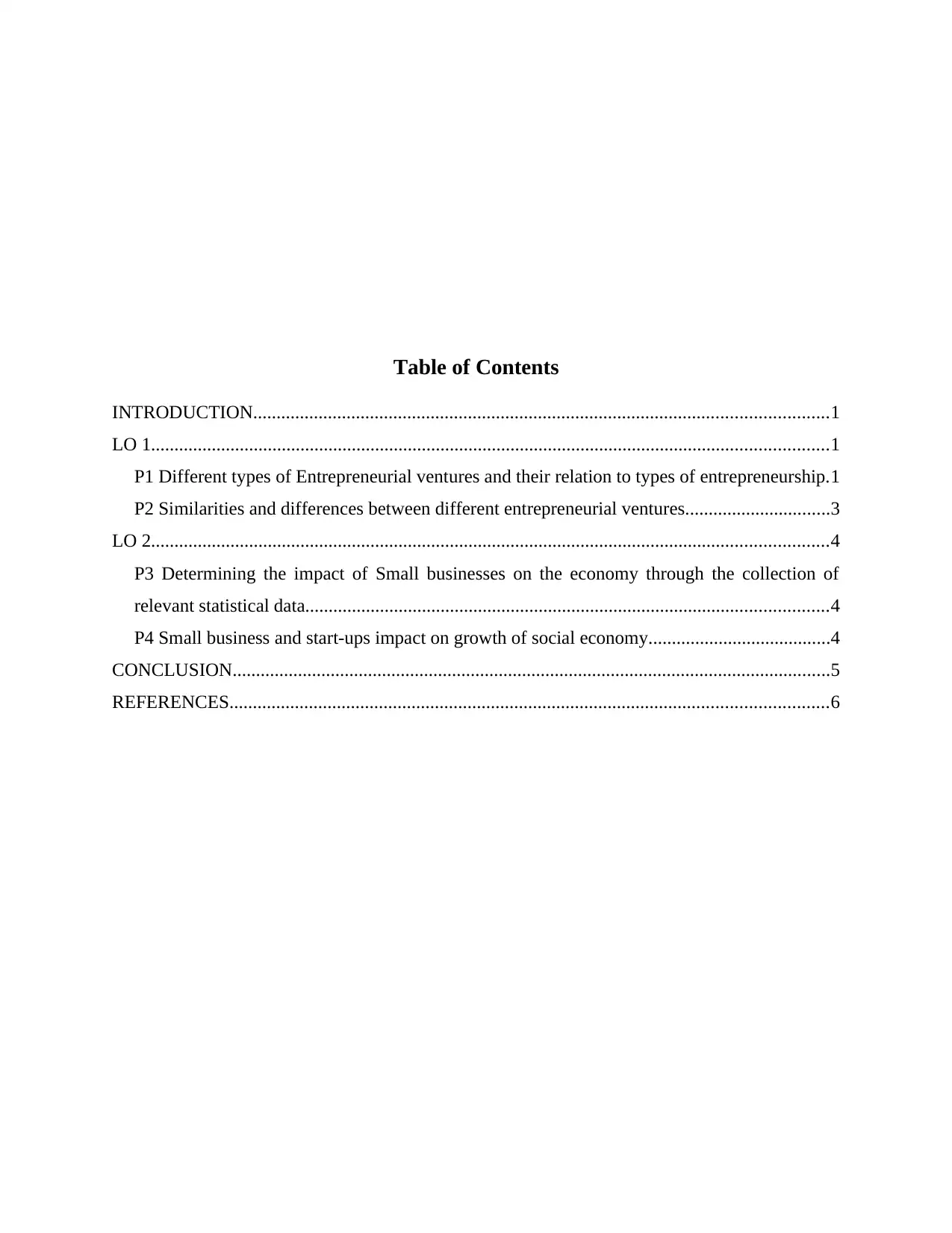
Table of Contents
INTRODUCTION...........................................................................................................................1
LO 1.................................................................................................................................................1
P1 Different types of Entrepreneurial ventures and their relation to types of entrepreneurship.1
P2 Similarities and differences between different entrepreneurial ventures...............................3
LO 2.................................................................................................................................................4
P3 Determining the impact of Small businesses on the economy through the collection of
relevant statistical data................................................................................................................4
P4 Small business and start-ups impact on growth of social economy.......................................4
CONCLUSION................................................................................................................................5
REFERENCES................................................................................................................................6
INTRODUCTION...........................................................................................................................1
LO 1.................................................................................................................................................1
P1 Different types of Entrepreneurial ventures and their relation to types of entrepreneurship.1
P2 Similarities and differences between different entrepreneurial ventures...............................3
LO 2.................................................................................................................................................4
P3 Determining the impact of Small businesses on the economy through the collection of
relevant statistical data................................................................................................................4
P4 Small business and start-ups impact on growth of social economy.......................................4
CONCLUSION................................................................................................................................5
REFERENCES................................................................................................................................6

⊘ This is a preview!⊘
Do you want full access?
Subscribe today to unlock all pages.

Trusted by 1+ million students worldwide
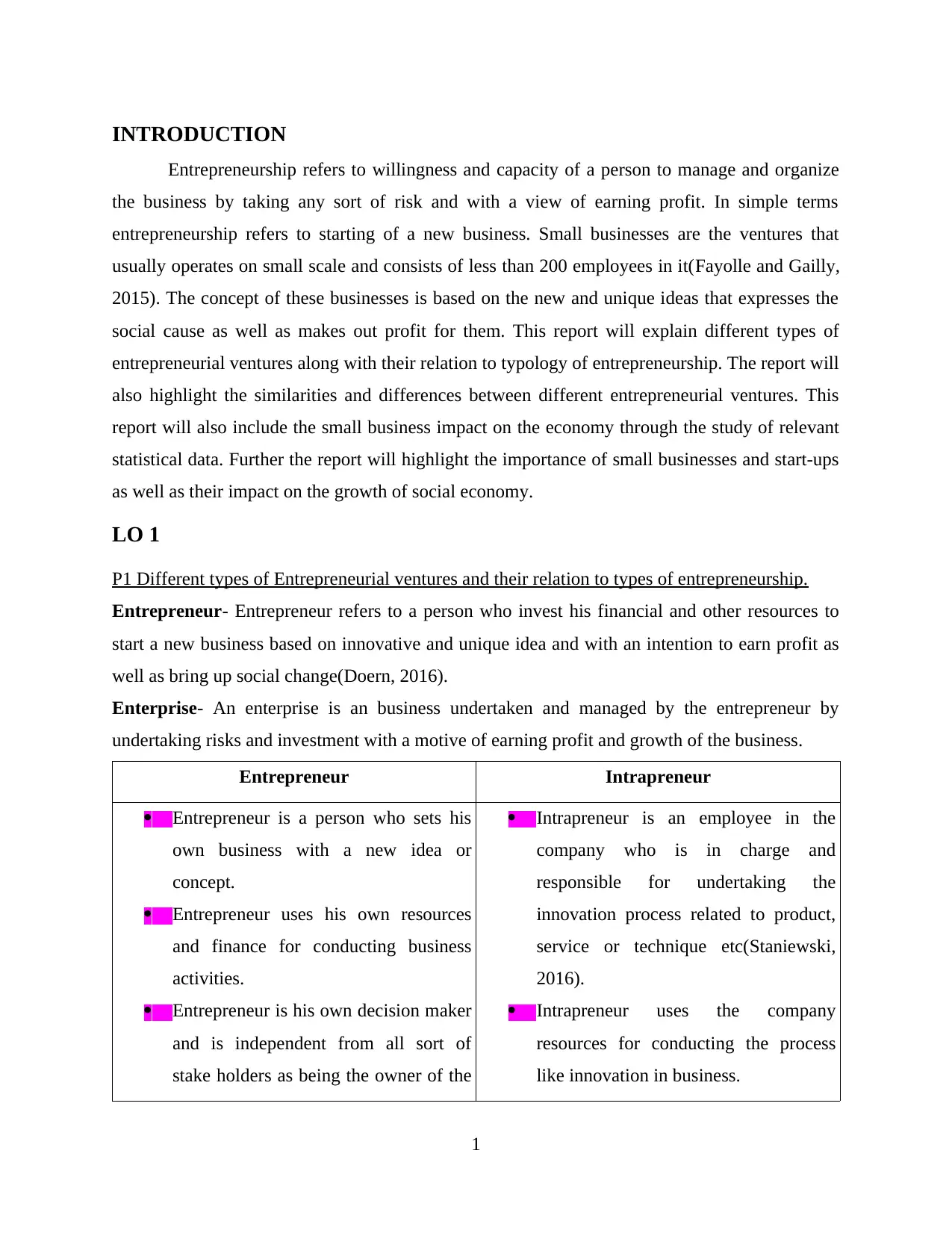
INTRODUCTION
Entrepreneurship refers to willingness and capacity of a person to manage and organize
the business by taking any sort of risk and with a view of earning profit. In simple terms
entrepreneurship refers to starting of a new business. Small businesses are the ventures that
usually operates on small scale and consists of less than 200 employees in it(Fayolle and Gailly,
2015). The concept of these businesses is based on the new and unique ideas that expresses the
social cause as well as makes out profit for them. This report will explain different types of
entrepreneurial ventures along with their relation to typology of entrepreneurship. The report will
also highlight the similarities and differences between different entrepreneurial ventures. This
report will also include the small business impact on the economy through the study of relevant
statistical data. Further the report will highlight the importance of small businesses and start-ups
as well as their impact on the growth of social economy.
LO 1
P1 Different types of Entrepreneurial ventures and their relation to types of entrepreneurship.
Entrepreneur- Entrepreneur refers to a person who invest his financial and other resources to
start a new business based on innovative and unique idea and with an intention to earn profit as
well as bring up social change(Doern, 2016).
Enterprise- An enterprise is an business undertaken and managed by the entrepreneur by
undertaking risks and investment with a motive of earning profit and growth of the business.
Entrepreneur Intrapreneur
Entrepreneur is a person who sets his
own business with a new idea or
concept.
Entrepreneur uses his own resources
and finance for conducting business
activities.
Entrepreneur is his own decision maker
and is independent from all sort of
stake holders as being the owner of the
Intrapreneur is an employee in the
company who is in charge and
responsible for undertaking the
innovation process related to product,
service or technique etc(Staniewski,
2016).
Intrapreneur uses the company
resources for conducting the process
like innovation in business.
1
Entrepreneurship refers to willingness and capacity of a person to manage and organize
the business by taking any sort of risk and with a view of earning profit. In simple terms
entrepreneurship refers to starting of a new business. Small businesses are the ventures that
usually operates on small scale and consists of less than 200 employees in it(Fayolle and Gailly,
2015). The concept of these businesses is based on the new and unique ideas that expresses the
social cause as well as makes out profit for them. This report will explain different types of
entrepreneurial ventures along with their relation to typology of entrepreneurship. The report will
also highlight the similarities and differences between different entrepreneurial ventures. This
report will also include the small business impact on the economy through the study of relevant
statistical data. Further the report will highlight the importance of small businesses and start-ups
as well as their impact on the growth of social economy.
LO 1
P1 Different types of Entrepreneurial ventures and their relation to types of entrepreneurship.
Entrepreneur- Entrepreneur refers to a person who invest his financial and other resources to
start a new business based on innovative and unique idea and with an intention to earn profit as
well as bring up social change(Doern, 2016).
Enterprise- An enterprise is an business undertaken and managed by the entrepreneur by
undertaking risks and investment with a motive of earning profit and growth of the business.
Entrepreneur Intrapreneur
Entrepreneur is a person who sets his
own business with a new idea or
concept.
Entrepreneur uses his own resources
and finance for conducting business
activities.
Entrepreneur is his own decision maker
and is independent from all sort of
stake holders as being the owner of the
Intrapreneur is an employee in the
company who is in charge and
responsible for undertaking the
innovation process related to product,
service or technique etc(Staniewski,
2016).
Intrapreneur uses the company
resources for conducting the process
like innovation in business.
1
Paraphrase This Document
Need a fresh take? Get an instant paraphrase of this document with our AI Paraphraser
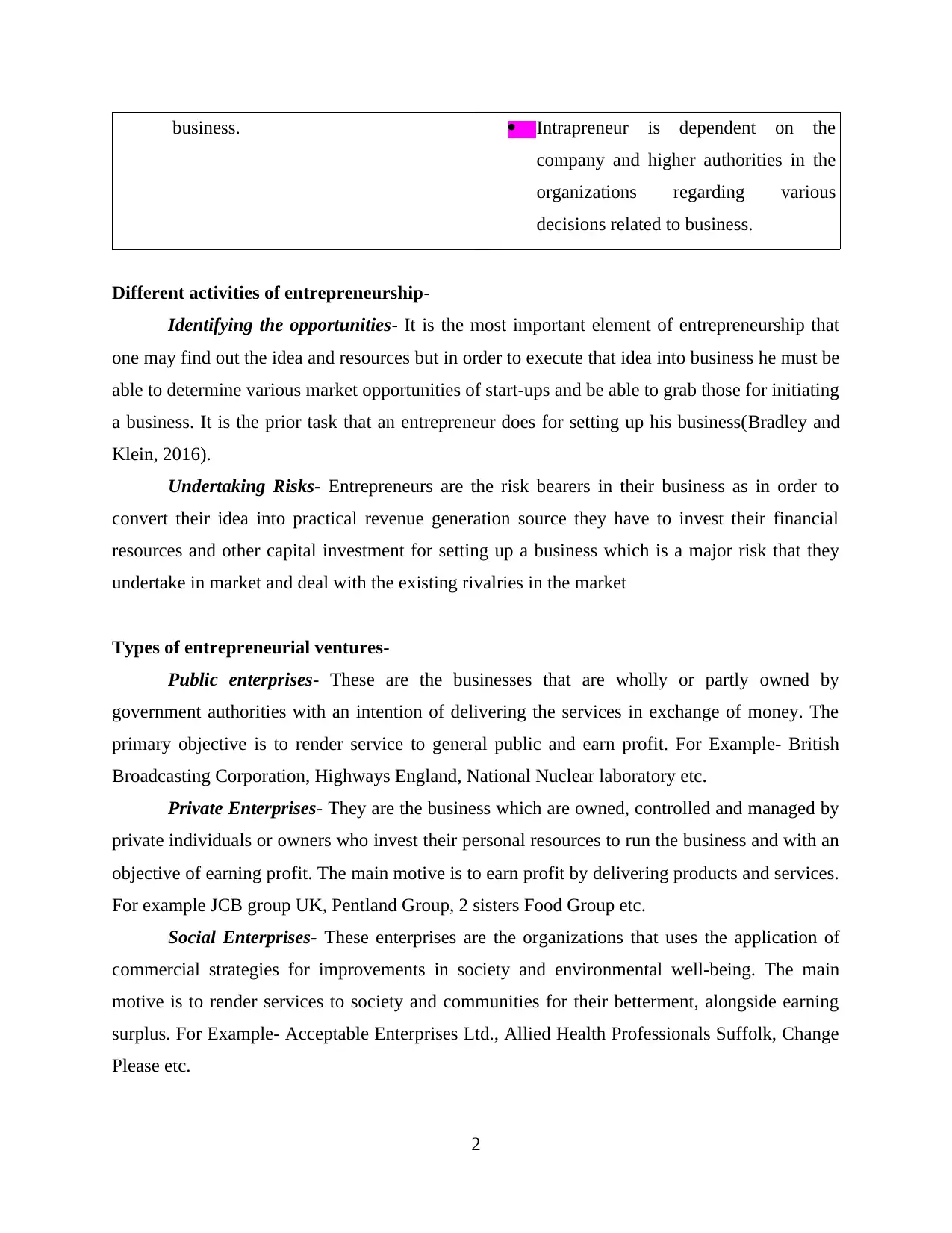
business. Intrapreneur is dependent on the
company and higher authorities in the
organizations regarding various
decisions related to business.
Different activities of entrepreneurship-
Identifying the opportunities- It is the most important element of entrepreneurship that
one may find out the idea and resources but in order to execute that idea into business he must be
able to determine various market opportunities of start-ups and be able to grab those for initiating
a business. It is the prior task that an entrepreneur does for setting up his business(Bradley and
Klein, 2016).
Undertaking Risks- Entrepreneurs are the risk bearers in their business as in order to
convert their idea into practical revenue generation source they have to invest their financial
resources and other capital investment for setting up a business which is a major risk that they
undertake in market and deal with the existing rivalries in the market
Types of entrepreneurial ventures-
Public enterprises- These are the businesses that are wholly or partly owned by
government authorities with an intention of delivering the services in exchange of money. The
primary objective is to render service to general public and earn profit. For Example- British
Broadcasting Corporation, Highways England, National Nuclear laboratory etc.
Private Enterprises- They are the business which are owned, controlled and managed by
private individuals or owners who invest their personal resources to run the business and with an
objective of earning profit. The main motive is to earn profit by delivering products and services.
For example JCB group UK, Pentland Group, 2 sisters Food Group etc.
Social Enterprises- These enterprises are the organizations that uses the application of
commercial strategies for improvements in society and environmental well-being. The main
motive is to render services to society and communities for their betterment, alongside earning
surplus. For Example- Acceptable Enterprises Ltd., Allied Health Professionals Suffolk, Change
Please etc.
2
company and higher authorities in the
organizations regarding various
decisions related to business.
Different activities of entrepreneurship-
Identifying the opportunities- It is the most important element of entrepreneurship that
one may find out the idea and resources but in order to execute that idea into business he must be
able to determine various market opportunities of start-ups and be able to grab those for initiating
a business. It is the prior task that an entrepreneur does for setting up his business(Bradley and
Klein, 2016).
Undertaking Risks- Entrepreneurs are the risk bearers in their business as in order to
convert their idea into practical revenue generation source they have to invest their financial
resources and other capital investment for setting up a business which is a major risk that they
undertake in market and deal with the existing rivalries in the market
Types of entrepreneurial ventures-
Public enterprises- These are the businesses that are wholly or partly owned by
government authorities with an intention of delivering the services in exchange of money. The
primary objective is to render service to general public and earn profit. For Example- British
Broadcasting Corporation, Highways England, National Nuclear laboratory etc.
Private Enterprises- They are the business which are owned, controlled and managed by
private individuals or owners who invest their personal resources to run the business and with an
objective of earning profit. The main motive is to earn profit by delivering products and services.
For example JCB group UK, Pentland Group, 2 sisters Food Group etc.
Social Enterprises- These enterprises are the organizations that uses the application of
commercial strategies for improvements in society and environmental well-being. The main
motive is to render services to society and communities for their betterment, alongside earning
surplus. For Example- Acceptable Enterprises Ltd., Allied Health Professionals Suffolk, Change
Please etc.
2
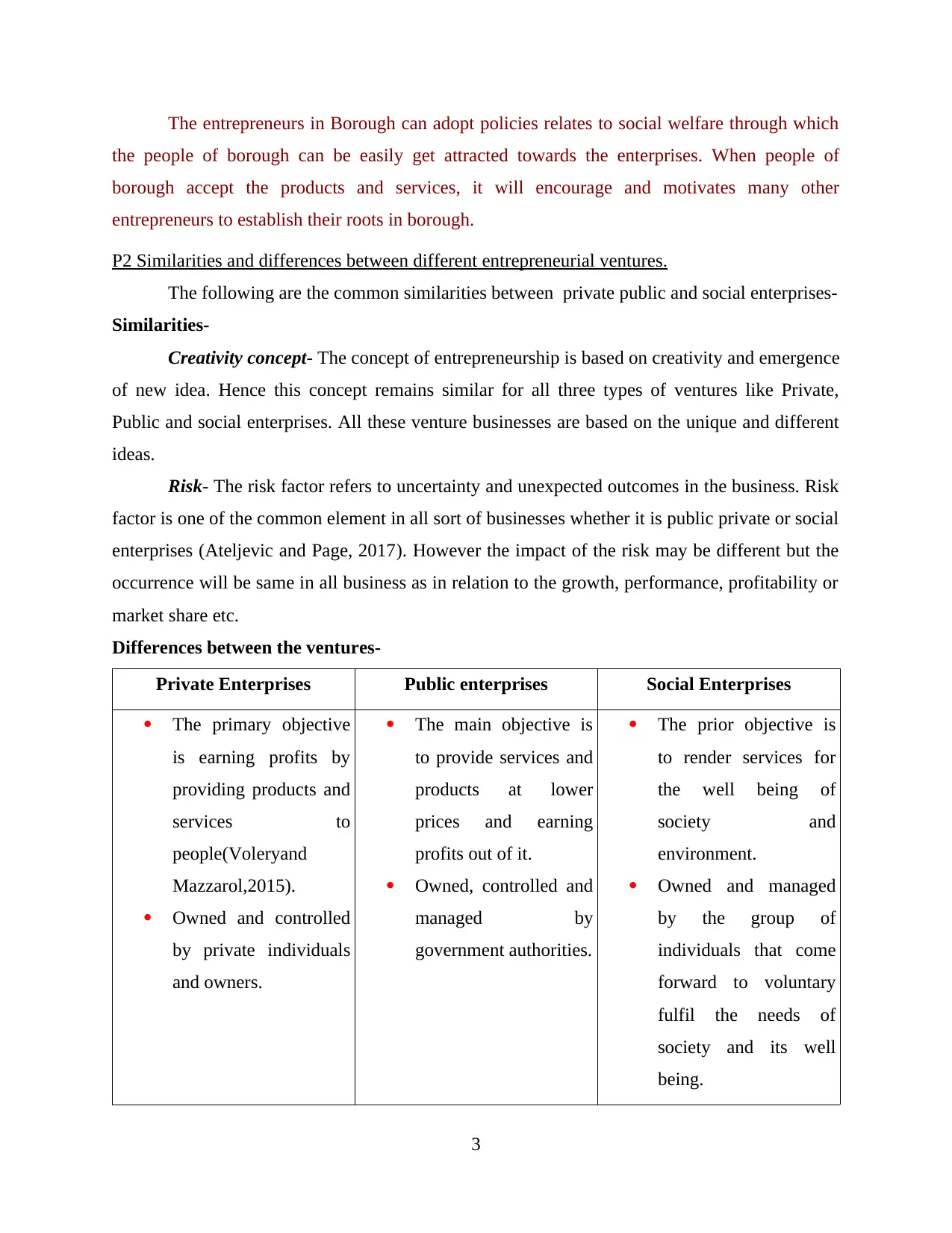
The entrepreneurs in Borough can adopt policies relates to social welfare through which
the people of borough can be easily get attracted towards the enterprises. When people of
borough accept the products and services, it will encourage and motivates many other
entrepreneurs to establish their roots in borough.
P2 Similarities and differences between different entrepreneurial ventures.
The following are the common similarities between private public and social enterprises-
Similarities-
Creativity concept- The concept of entrepreneurship is based on creativity and emergence
of new idea. Hence this concept remains similar for all three types of ventures like Private,
Public and social enterprises. All these venture businesses are based on the unique and different
ideas.
Risk- The risk factor refers to uncertainty and unexpected outcomes in the business. Risk
factor is one of the common element in all sort of businesses whether it is public private or social
enterprises (Ateljevic and Page, 2017). However the impact of the risk may be different but the
occurrence will be same in all business as in relation to the growth, performance, profitability or
market share etc.
Differences between the ventures-
Private Enterprises Public enterprises Social Enterprises
The primary objective
is earning profits by
providing products and
services to
people(Voleryand
Mazzarol,2015).
Owned and controlled
by private individuals
and owners.
The main objective is
to provide services and
products at lower
prices and earning
profits out of it.
Owned, controlled and
managed by
government authorities.
The prior objective is
to render services for
the well being of
society and
environment.
Owned and managed
by the group of
individuals that come
forward to voluntary
fulfil the needs of
society and its well
being.
3
the people of borough can be easily get attracted towards the enterprises. When people of
borough accept the products and services, it will encourage and motivates many other
entrepreneurs to establish their roots in borough.
P2 Similarities and differences between different entrepreneurial ventures.
The following are the common similarities between private public and social enterprises-
Similarities-
Creativity concept- The concept of entrepreneurship is based on creativity and emergence
of new idea. Hence this concept remains similar for all three types of ventures like Private,
Public and social enterprises. All these venture businesses are based on the unique and different
ideas.
Risk- The risk factor refers to uncertainty and unexpected outcomes in the business. Risk
factor is one of the common element in all sort of businesses whether it is public private or social
enterprises (Ateljevic and Page, 2017). However the impact of the risk may be different but the
occurrence will be same in all business as in relation to the growth, performance, profitability or
market share etc.
Differences between the ventures-
Private Enterprises Public enterprises Social Enterprises
The primary objective
is earning profits by
providing products and
services to
people(Voleryand
Mazzarol,2015).
Owned and controlled
by private individuals
and owners.
The main objective is
to provide services and
products at lower
prices and earning
profits out of it.
Owned, controlled and
managed by
government authorities.
The prior objective is
to render services for
the well being of
society and
environment.
Owned and managed
by the group of
individuals that come
forward to voluntary
fulfil the needs of
society and its well
being.
3
⊘ This is a preview!⊘
Do you want full access?
Subscribe today to unlock all pages.

Trusted by 1+ million students worldwide
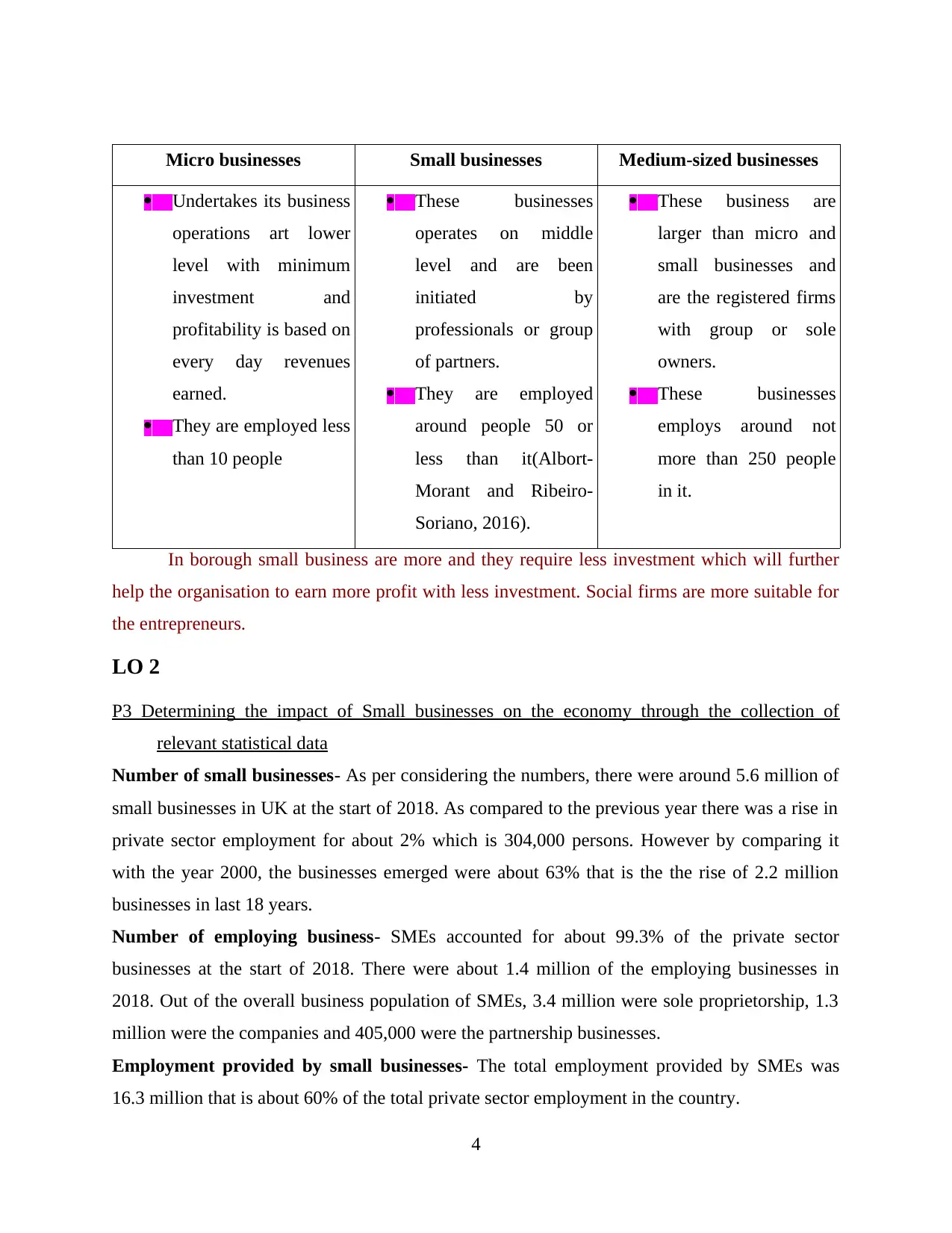
Micro businesses Small businesses Medium-sized businesses
Undertakes its business
operations art lower
level with minimum
investment and
profitability is based on
every day revenues
earned.
They are employed less
than 10 people
These businesses
operates on middle
level and are been
initiated by
professionals or group
of partners.
They are employed
around people 50 or
less than it(Albort-
Morant and Ribeiro-
Soriano, 2016).
These business are
larger than micro and
small businesses and
are the registered firms
with group or sole
owners.
These businesses
employs around not
more than 250 people
in it.
In borough small business are more and they require less investment which will further
help the organisation to earn more profit with less investment. Social firms are more suitable for
the entrepreneurs.
LO 2
P3 Determining the impact of Small businesses on the economy through the collection of
relevant statistical data
Number of small businesses- As per considering the numbers, there were around 5.6 million of
small businesses in UK at the start of 2018. As compared to the previous year there was a rise in
private sector employment for about 2% which is 304,000 persons. However by comparing it
with the year 2000, the businesses emerged were about 63% that is the the rise of 2.2 million
businesses in last 18 years.
Number of employing business- SMEs accounted for about 99.3% of the private sector
businesses at the start of 2018. There were about 1.4 million of the employing businesses in
2018. Out of the overall business population of SMEs, 3.4 million were sole proprietorship, 1.3
million were the companies and 405,000 were the partnership businesses.
Employment provided by small businesses- The total employment provided by SMEs was
16.3 million that is about 60% of the total private sector employment in the country.
4
Undertakes its business
operations art lower
level with minimum
investment and
profitability is based on
every day revenues
earned.
They are employed less
than 10 people
These businesses
operates on middle
level and are been
initiated by
professionals or group
of partners.
They are employed
around people 50 or
less than it(Albort-
Morant and Ribeiro-
Soriano, 2016).
These business are
larger than micro and
small businesses and
are the registered firms
with group or sole
owners.
These businesses
employs around not
more than 250 people
in it.
In borough small business are more and they require less investment which will further
help the organisation to earn more profit with less investment. Social firms are more suitable for
the entrepreneurs.
LO 2
P3 Determining the impact of Small businesses on the economy through the collection of
relevant statistical data
Number of small businesses- As per considering the numbers, there were around 5.6 million of
small businesses in UK at the start of 2018. As compared to the previous year there was a rise in
private sector employment for about 2% which is 304,000 persons. However by comparing it
with the year 2000, the businesses emerged were about 63% that is the the rise of 2.2 million
businesses in last 18 years.
Number of employing business- SMEs accounted for about 99.3% of the private sector
businesses at the start of 2018. There were about 1.4 million of the employing businesses in
2018. Out of the overall business population of SMEs, 3.4 million were sole proprietorship, 1.3
million were the companies and 405,000 were the partnership businesses.
Employment provided by small businesses- The total employment provided by SMEs was
16.3 million that is about 60% of the total private sector employment in the country.
4
Paraphrase This Document
Need a fresh take? Get an instant paraphrase of this document with our AI Paraphraser
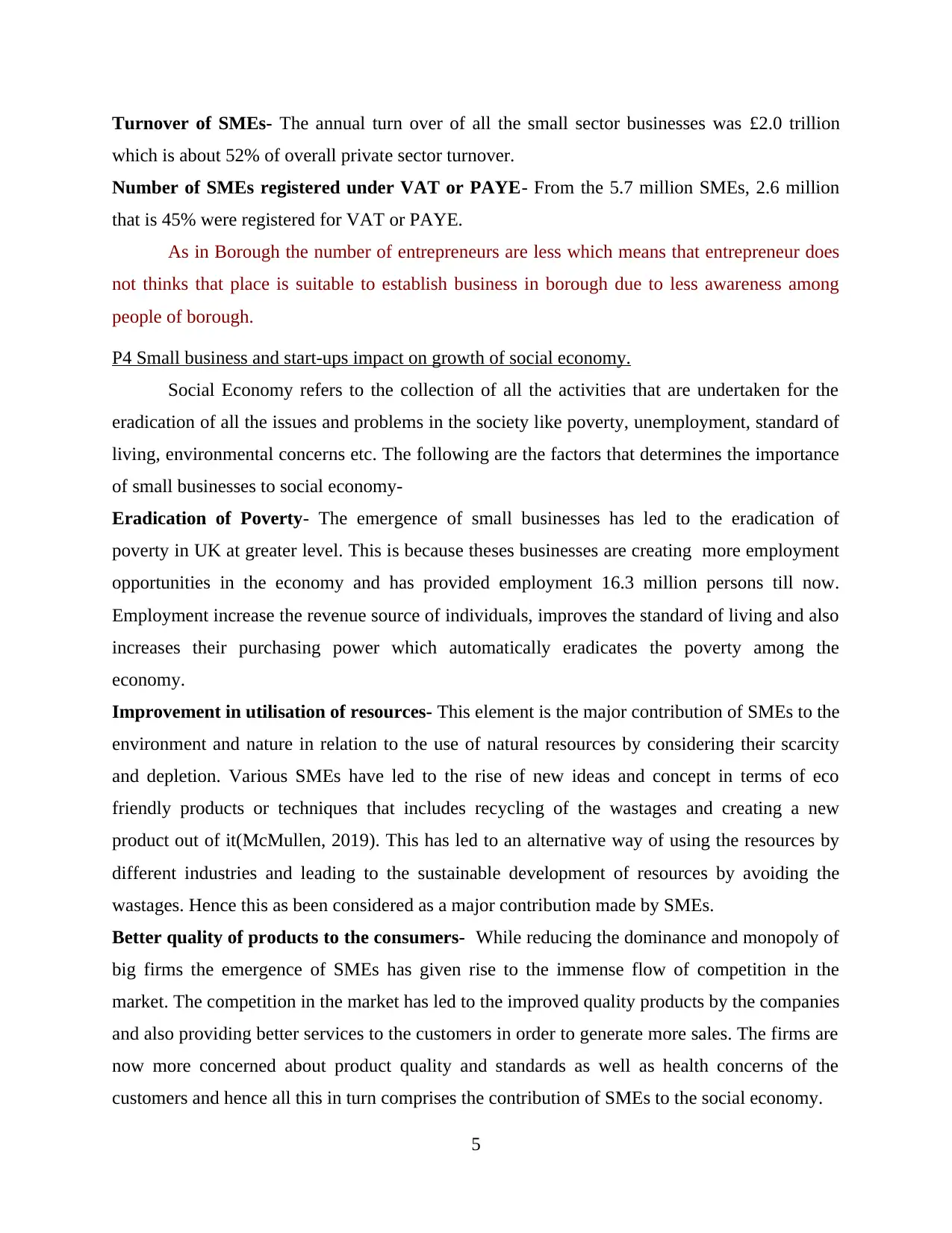
Turnover of SMEs- The annual turn over of all the small sector businesses was £2.0 trillion
which is about 52% of overall private sector turnover.
Number of SMEs registered under VAT or PAYE- From the 5.7 million SMEs, 2.6 million
that is 45% were registered for VAT or PAYE.
As in Borough the number of entrepreneurs are less which means that entrepreneur does
not thinks that place is suitable to establish business in borough due to less awareness among
people of borough.
P4 Small business and start-ups impact on growth of social economy.
Social Economy refers to the collection of all the activities that are undertaken for the
eradication of all the issues and problems in the society like poverty, unemployment, standard of
living, environmental concerns etc. The following are the factors that determines the importance
of small businesses to social economy-
Eradication of Poverty- The emergence of small businesses has led to the eradication of
poverty in UK at greater level. This is because theses businesses are creating more employment
opportunities in the economy and has provided employment 16.3 million persons till now.
Employment increase the revenue source of individuals, improves the standard of living and also
increases their purchasing power which automatically eradicates the poverty among the
economy.
Improvement in utilisation of resources- This element is the major contribution of SMEs to the
environment and nature in relation to the use of natural resources by considering their scarcity
and depletion. Various SMEs have led to the rise of new ideas and concept in terms of eco
friendly products or techniques that includes recycling of the wastages and creating a new
product out of it(McMullen, 2019). This has led to an alternative way of using the resources by
different industries and leading to the sustainable development of resources by avoiding the
wastages. Hence this as been considered as a major contribution made by SMEs.
Better quality of products to the consumers- While reducing the dominance and monopoly of
big firms the emergence of SMEs has given rise to the immense flow of competition in the
market. The competition in the market has led to the improved quality products by the companies
and also providing better services to the customers in order to generate more sales. The firms are
now more concerned about product quality and standards as well as health concerns of the
customers and hence all this in turn comprises the contribution of SMEs to the social economy.
5
which is about 52% of overall private sector turnover.
Number of SMEs registered under VAT or PAYE- From the 5.7 million SMEs, 2.6 million
that is 45% were registered for VAT or PAYE.
As in Borough the number of entrepreneurs are less which means that entrepreneur does
not thinks that place is suitable to establish business in borough due to less awareness among
people of borough.
P4 Small business and start-ups impact on growth of social economy.
Social Economy refers to the collection of all the activities that are undertaken for the
eradication of all the issues and problems in the society like poverty, unemployment, standard of
living, environmental concerns etc. The following are the factors that determines the importance
of small businesses to social economy-
Eradication of Poverty- The emergence of small businesses has led to the eradication of
poverty in UK at greater level. This is because theses businesses are creating more employment
opportunities in the economy and has provided employment 16.3 million persons till now.
Employment increase the revenue source of individuals, improves the standard of living and also
increases their purchasing power which automatically eradicates the poverty among the
economy.
Improvement in utilisation of resources- This element is the major contribution of SMEs to the
environment and nature in relation to the use of natural resources by considering their scarcity
and depletion. Various SMEs have led to the rise of new ideas and concept in terms of eco
friendly products or techniques that includes recycling of the wastages and creating a new
product out of it(McMullen, 2019). This has led to an alternative way of using the resources by
different industries and leading to the sustainable development of resources by avoiding the
wastages. Hence this as been considered as a major contribution made by SMEs.
Better quality of products to the consumers- While reducing the dominance and monopoly of
big firms the emergence of SMEs has given rise to the immense flow of competition in the
market. The competition in the market has led to the improved quality products by the companies
and also providing better services to the customers in order to generate more sales. The firms are
now more concerned about product quality and standards as well as health concerns of the
customers and hence all this in turn comprises the contribution of SMEs to the social economy.
5
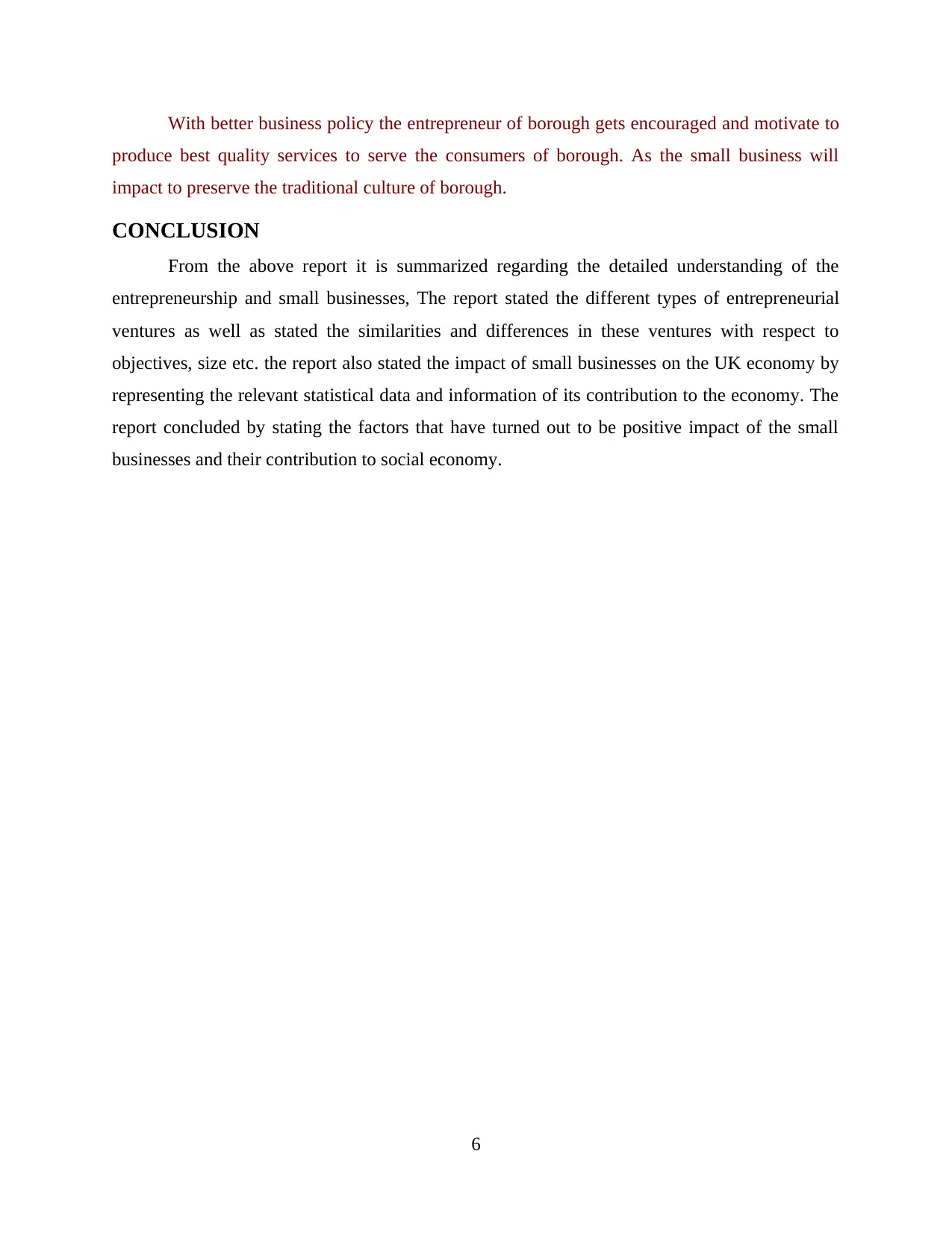
With better business policy the entrepreneur of borough gets encouraged and motivate to
produce best quality services to serve the consumers of borough. As the small business will
impact to preserve the traditional culture of borough.
CONCLUSION
From the above report it is summarized regarding the detailed understanding of the
entrepreneurship and small businesses, The report stated the different types of entrepreneurial
ventures as well as stated the similarities and differences in these ventures with respect to
objectives, size etc. the report also stated the impact of small businesses on the UK economy by
representing the relevant statistical data and information of its contribution to the economy. The
report concluded by stating the factors that have turned out to be positive impact of the small
businesses and their contribution to social economy.
6
produce best quality services to serve the consumers of borough. As the small business will
impact to preserve the traditional culture of borough.
CONCLUSION
From the above report it is summarized regarding the detailed understanding of the
entrepreneurship and small businesses, The report stated the different types of entrepreneurial
ventures as well as stated the similarities and differences in these ventures with respect to
objectives, size etc. the report also stated the impact of small businesses on the UK economy by
representing the relevant statistical data and information of its contribution to the economy. The
report concluded by stating the factors that have turned out to be positive impact of the small
businesses and their contribution to social economy.
6
⊘ This is a preview!⊘
Do you want full access?
Subscribe today to unlock all pages.

Trusted by 1+ million students worldwide
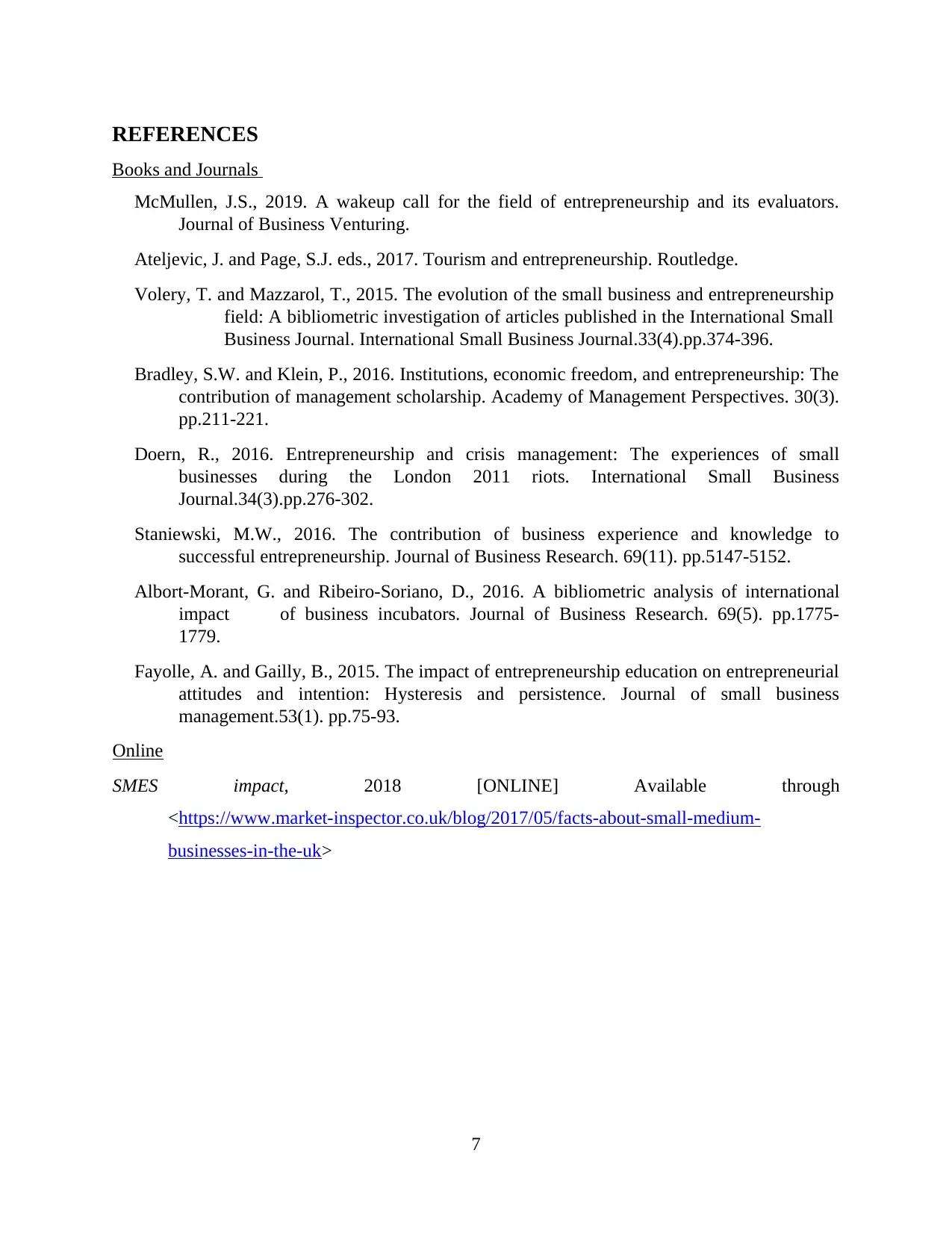
REFERENCES
Books and Journals
McMullen, J.S., 2019. A wakeup call for the field of entrepreneurship and its evaluators.
Journal of Business Venturing.
Ateljevic, J. and Page, S.J. eds., 2017. Tourism and entrepreneurship. Routledge.
Volery, T. and Mazzarol, T., 2015. The evolution of the small business and entrepreneurship
field: A bibliometric investigation of articles published in the International Small
Business Journal. International Small Business Journal.33(4).pp.374-396.
Bradley, S.W. and Klein, P., 2016. Institutions, economic freedom, and entrepreneurship: The
contribution of management scholarship. Academy of Management Perspectives. 30(3).
pp.211-221.
Doern, R., 2016. Entrepreneurship and crisis management: The experiences of small
businesses during the London 2011 riots. International Small Business
Journal.34(3).pp.276-302.
Staniewski, M.W., 2016. The contribution of business experience and knowledge to
successful entrepreneurship. Journal of Business Research. 69(11). pp.5147-5152.
Albort-Morant, G. and Ribeiro-Soriano, D., 2016. A bibliometric analysis of international
impact of business incubators. Journal of Business Research. 69(5). pp.1775-
1779.
Fayolle, A. and Gailly, B., 2015. The impact of entrepreneurship education on entrepreneurial
attitudes and intention: Hysteresis and persistence. Journal of small business
management.53(1). pp.75-93.
Online
SMES impact, 2018 [ONLINE] Available through
<https://www.market-inspector.co.uk/blog/2017/05/facts-about-small-medium-
businesses-in-the-uk>
7
Books and Journals
McMullen, J.S., 2019. A wakeup call for the field of entrepreneurship and its evaluators.
Journal of Business Venturing.
Ateljevic, J. and Page, S.J. eds., 2017. Tourism and entrepreneurship. Routledge.
Volery, T. and Mazzarol, T., 2015. The evolution of the small business and entrepreneurship
field: A bibliometric investigation of articles published in the International Small
Business Journal. International Small Business Journal.33(4).pp.374-396.
Bradley, S.W. and Klein, P., 2016. Institutions, economic freedom, and entrepreneurship: The
contribution of management scholarship. Academy of Management Perspectives. 30(3).
pp.211-221.
Doern, R., 2016. Entrepreneurship and crisis management: The experiences of small
businesses during the London 2011 riots. International Small Business
Journal.34(3).pp.276-302.
Staniewski, M.W., 2016. The contribution of business experience and knowledge to
successful entrepreneurship. Journal of Business Research. 69(11). pp.5147-5152.
Albort-Morant, G. and Ribeiro-Soriano, D., 2016. A bibliometric analysis of international
impact of business incubators. Journal of Business Research. 69(5). pp.1775-
1779.
Fayolle, A. and Gailly, B., 2015. The impact of entrepreneurship education on entrepreneurial
attitudes and intention: Hysteresis and persistence. Journal of small business
management.53(1). pp.75-93.
Online
SMES impact, 2018 [ONLINE] Available through
<https://www.market-inspector.co.uk/blog/2017/05/facts-about-small-medium-
businesses-in-the-uk>
7
1 out of 10
Related Documents
Your All-in-One AI-Powered Toolkit for Academic Success.
+13062052269
info@desklib.com
Available 24*7 on WhatsApp / Email
![[object Object]](/_next/static/media/star-bottom.7253800d.svg)
Unlock your academic potential
Copyright © 2020–2026 A2Z Services. All Rights Reserved. Developed and managed by ZUCOL.




